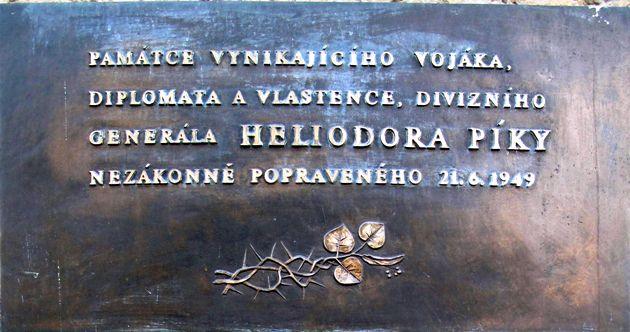65th anniversary of Czechoslovak Communists' execution of general who knew too much

Tomorrow will mark 65 years since the Communists executed General Heliodor Píka in the town of Plzeň. A memorial service for Píka was held today in front of the building of the General Staff and attended by Czech Defense Minister Martin Stropnický and Chief of Staff Petr Pavel.
Píka’s fate is also being commemorated by several exhibitions this year. "After the war, General Píka enjoyed extraordinary authority in the officers’ corps, authority that threatened the Communists’ plans to seize power… during the war he exposed the system of Soviet gulags in operation and knew too much about them, he had to be disappeared," Minister Stropnický said in his speech.
"President Edvard Beneš entrusted him with leading our military mission in the Soviet Union," said Jana Horáková, who administers Píka’s estate. She believes the fact that he knew too much about the gulags and other things the Communists wanted kept secret sealed his fate.
"After the war he became inconvenient," the historian said. Píka had detailed information about the horrors of the gulags and recalled that information at a time when the world was only beginning to suspect what might have happened to the thousands of Polish soldiers who were executed by the Soviets at Katyn and knew next to nothing about the gulag system.
The noose began to tighten around the general’s neck when, as the head of the Czechoslovak military mission, he did everything possible to get the Soviets to release Czechoslovaks who had been tortured. Had those prisoners not existed, a Czechoslovak military unit inside the Soviet Union would never have even been created.
The fact that Píka pushed through the creation of such a unit with the Soviets over the initially opinionated resistance of Communist leader Gottwald was a great burden to the general after the war. Píka’s full story is told on the website Totalita.cz (in Czech only).
Heliodor Píka was convicted during a show trial of having "betrayed – at the end of 1940 in Istanbul, from 1941 through 1945 in Moscow, in the spring of 1946 in London, and lastly between 1945 and 1948 in Prague – facts, measures and objects to members of the British Intelligence Service that were meant to remain secret for the defense of the republic." One of the two plaintiffs who brought suit against him was the infamous Communist Prosecutor Karel Vaš.
Vaš himself did not stand trial until 2001. A court found him guilty and sentenced him to seven years in prison, but an appeals court overturned the conviction because the statute of limitations had expired in 1994 for the crime of which he was accused.
The former secret collaborator with the Soviet secret services, the NKVD (later the KGB), escaped punishment and never felt the need to apologize for his crimes to the general’s surviving relative, Milan Píka. After the general was convicted, Czechoslovak President Klement Gottwald refused to grant him clemency, and the order to execute him was carried out in the early morning hours of 21 June 1949 in the courtyard of the Bory Prison in Plzeň.
General Heliodor Píka had attended school together with French President de Gaulle, and when he was executed, a one-day state holiday of mourning was declared in France. At the initiative of the general’s son Milan and his defense attorney Rastislav Váhala, his trial was posthumously reopened in 1968.
An independent military court concluded that there was no evidence that the general had revealed any especially important state secrets to anyone. The preparations for and course of the 1949 trial are clearly marked by directions that indicate the investigation and trial were solely meant to prove the previously adopted conclusions and decisions of the political organizers.
General Píka was therefore arrested and imprisoned without any incriminating evidence ever being provided. The basic document charging him with espionage has been proven a fake.
The court fully acquitted Heliodor Píka and fully rehabilitated him. Now, until 30 November this year, there is an exhibition recalling his story at the World War Two Memorial in the town of Hrabyně na Opavsku. The exhibition also includes his personal weapons collection.
The pistol, for example, was excavated near the house in which he was born decades after he was executed. The exhibition presents him in his roles as legionnaire and military diplomat and includes many documents and photographs.
Another exhibition in Plzeň will be opened tomorrow. Píka was executed there.
Heliodor Píka was born in 1897 in Štítina na Opavsku. As a member of the Czechoslovak Legions he participated in fighting on the French front during the First World War.
He graduated from the Military Academy in Paris, worked at the Military Academy in Hranice, Czechoslovakia, and then for the headquarters of the Czechoslovak Army. From 1932 to 1937 he was military attaché in Romania with accreditation for Turkey as well.
During the Second World War, Píka created a branch of the Czechoslovak resistance with the cover name DORA and worked as a military and political rapporteur for the government and as commander of its military mission in the Soviet Union. After the war he became Deputy Chief of Staff.
By that time, however, he was already under surveillance. After the Communist putsch in February 1948 he was released from the Army and subsequently imprisoned.